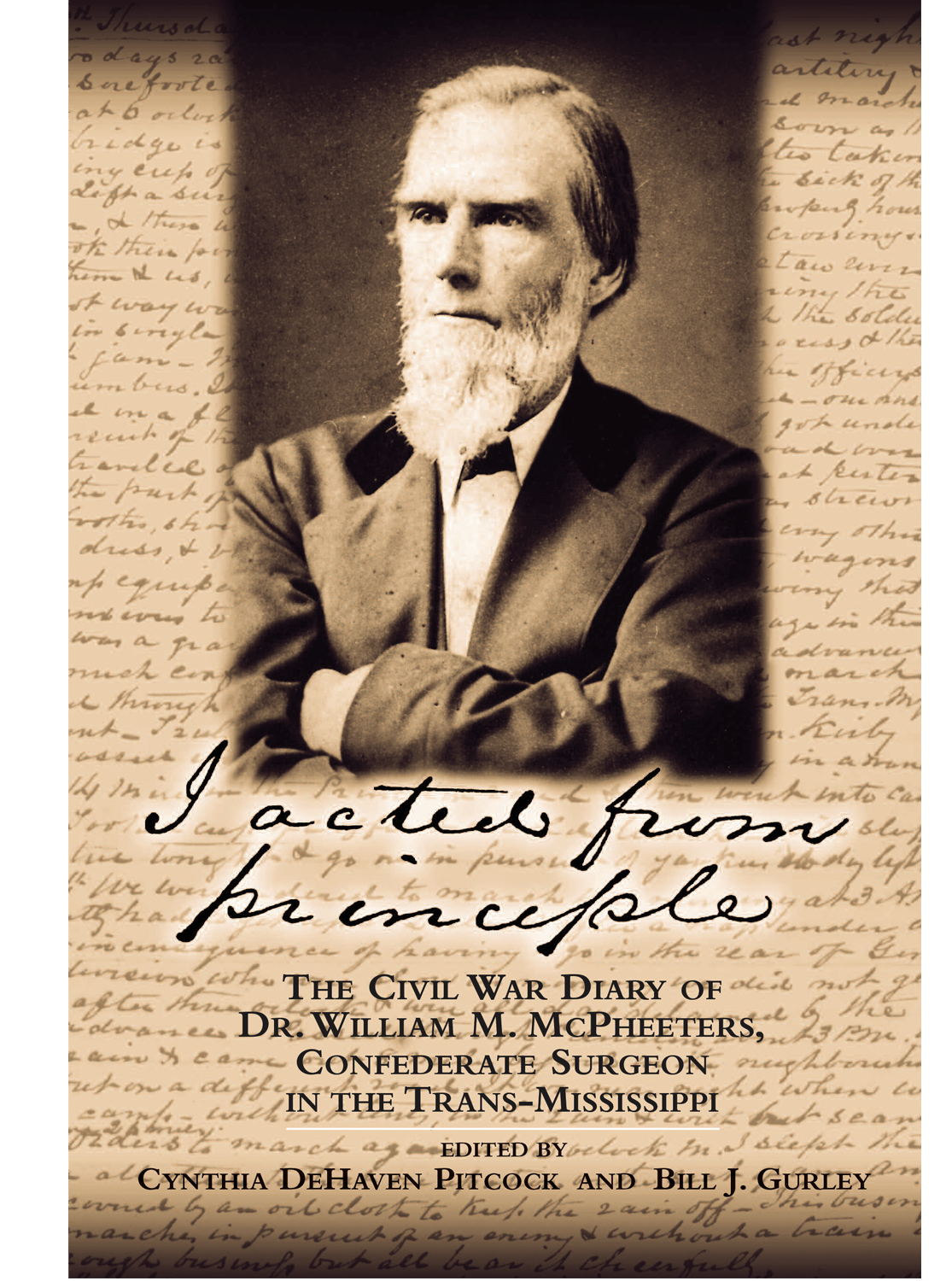A ForeWord magazine “Breakout Book” for fall 2002: “Expertly editedand annotated.”
At the start of the Civil War, Dr. William McPheeters was a distinguished physician in St. Louis, conducting unprecedented public-health research, forging new medical standards, and organizing the state’s first professional associations. But Missouri was a volatile border state. Under martial law, Union authorities kept close watch on known Confederate sympathizers. McPheeters was followed, arrested, threatened, and finally, in 1862, given an ultimatum: sign an oath of allegiance to the Union or go to federal prison. McPheeters “acted from principle” instead, fleeing by night to Confederate territory. He served as a surgeon under Gen. Sterling Price and his Missouri forces west of the Mississippi River, treating soldiers’ diseases, malnutrition, and terrible battle wounds.
From almost the moment of his departure, the doctor kept a diary. It was a pocket-size notebook which he made by folding sheets of pale blue writing paper in half and in which he wrote in miniature with his steel pen. It is the first known daily account by a Confederate medical officer in the Trans-Mississippi Department. It also tells his wife’s story, which included harassment by Federal military officials, imprisonment in St. Louis, and banishment from Missouri with the couple’s two small children. The journal appears here in its complete and original form, exactly as the doctor first wrote it, with the addition of the editors’ full annotation and vivid introductions to each section.
Cynthia DeHaven Pitcock is a historian of medicine at the University of Arkansas for Medical Sciences.
Bill J. Gurley is a Civil War enthusiast and a professor of pharmacology at the University of Arkansas for Medical Sciences.
“A fascinating book… the editors have meticulously identified in endnotes over 300 individuals mentioned in the diary [and] there is an excellent introduction to each of the eleven chapters that puts every campaign into its regional context.”
—Arkansas Historical Quarterly
“…Richly rewarding for readers interested in the Trans-Mississippi Department, medical history, life under Union occupation, and Civil War camp life and social history.”
—North Carolina Historical Review
“Pitcock and Gurley are able to transmute [McPheeters’s] humdrum observations into one of the most interesting books we have about the war in the Bear State… terrific work.”
—Arkansas Times
“The Civil War in the West has a single goal: to promote historical writing about the war in the western states and territories. It focuses most particularly on the Trans-Mississippi theater, which consisted of Missouri, Arkansas, Texas, most of Louisiana (west of the Mississippi River), Indian Territory (modern day Oklahoma), and Arizona Territory (two-fifths of modern day Arizona and New Mexico) but encompasses adjacent states, such as Kansas, Tennessee, and Mississippi, that directly influenced the Trans-Mississippi war. It is a wide swath, to be sure, but one too often ignored by historians and, consequently, too little understood and appreciated.
Topically, the series embraces all aspects of the wartime story. Military history in its many guises, from the strategies of generals to the daily lives of common soldiers, forms an important part of that story, but so, too, do the numerous and complex political, economic, social, and diplomatic dimensions of the war. The series also provides a variety of perspectives on these topics. Most importantly, it offers the best in modern scholarship, with thoughtful, challenging monographs.
Secondly, it presents new editions of important books that have gone out of print. And thirdly, it premieres expertly edited correspondence, diaries, reminiscences, and other writings by participants in the war.
It is a formidable challenge, but by focusing on some of the least familiar dimensions of the conflict, The Civil War in the West significantly broadens our understanding of the nation’s most pivotal and dramatic story.”
—Daniel Sutherland, from the preface of I Do Wish This Cruel War Was Over

